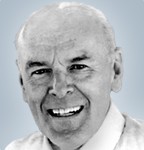Writing was Richard Peck’s first dream, but he came of age in an era when boys were not encouraged to take chances. After college, the U.S. Army drafted him and shipped him to Stuttgart, Germany as a chaplain’s assistant where he set himself up as a ghostwriter for sermons. “It was the first time I wrote to an audience,” he says. At the time, Peck felt he wasted two years of his life, but upon reflection considers his experience an apprenticeship in the last place he would have looked. “Sermons are novels,” he says. “They have beginnings, middles and ends and morals. And they depend upon research, because a sermon is based on the Biblical text.”
After earning his master’s degree, Peck taught English in a variety of classroom settings from graduate school to high school, but he thought he would have to begin his professional life over when administrators reassigned him to junior high school. “Nothing I had ever done or read was going to work,” he says, but from the moment he entered his seventh grade classroom, he knew “this is where I want to be, at the beginning of these lives. I don’t know that I would have been a writer had I not had the experience of being with young people all day long. I found my readers in the classroom…The situation I would have avoided if I could, gave me everything.”
In the early 1970s after several years in the classroom, Peck gave himself permission to quit teaching and “write or die.” He gathered 30 popular young adult novels and figured “I ought to know about them because I’ve just been with this group.” Reading one novel per day, he studied the elements of each story and then wrote one. Don’t Look and It Won’t Hurt sold overnight and his editor said, “You may start your second novel.” Specific young adult authors who influenced Peck include Robert Cormier (The Chocolate War), Paul Zindel (The Pigman) and S.E. Hinton (The Outsiders). “We write by the light of every book we ever read,” Peck says.
Peck’s readers have showered him with Reader’s Choice awards, but Peck had been a writer for decades before A Long Way From Chicago received the Newbery Honor Award in 1999 and A Year Down Yonder won the 2001 Newbery Medal. “You can’t say I peaked early,” he quips. In 2002, Peck received the National Humanities Medal for his body of work for young adults, at a time he says, “when First Lady Laura Bush elevated children’s books by creating a level of parity between children’s writers and adult writers.”
Peck says his novels are about survival. About taking independent action. About not waiting for the peer group to make your choices for you. Peck read The Adventures of Huckleberry Finn (by Mark Twain) in fourth grade and still keeps a copy on his desk. “All of my main characters are Huckleberry Finn,” he says. “Grandma Dowdel is Huckleberry Finn in a Lane Bryant dress.” Like Huck, Peck’s characters come from behind, live outside the system and go forward because they cannot go back.
Writing from his home in New York City, Peck spurns the computer for an electric typewriter. He edits his pages, pen in hand, and retypes when he can no longer read them. When he reaches the end of the book, he throws away the first chapter. “I am writing with so much more confidence,” he says. He rewrites the first chapter “shorter and stronger and aiming all in the right direction with all the irrelevancies removed.”
Although most of Peck’s novels are set in the past, the 75-year-old author does not trust his own memories. “I’m writing for people who cannot remember 9/11. I’m just like anybody else my age. I think, ‘Oh, if I could only take them back. If they could only have the kind of education I got. If they could only have the kind of community I came from and the extended family.’ Well, I do that. I give them elderly people in my books reaching out across lifetimes to touch their hands.” In his business he says an author cannot lament the present and successfully communicate with people who have only a present. “The young have a very limited tolerance for the stories of the old folks and how rigorous our comings of age were,” he says. Now that he is no longer in the classroom, he says, “I actively search for kid voices. I sit behind them on the bus and go out of my way to hear them.” When Peck finds the right voice for a particular project, he feels he can begin writing. “It doesn’t come on the first day and it doesn’t come unbidden,” he says. Peck’s novels are not self-expression, but tools of communication with his readers. “They are not interested in my life,” he says. “They are interested in theirs…A story must be entertainment before it can be anything else.”


